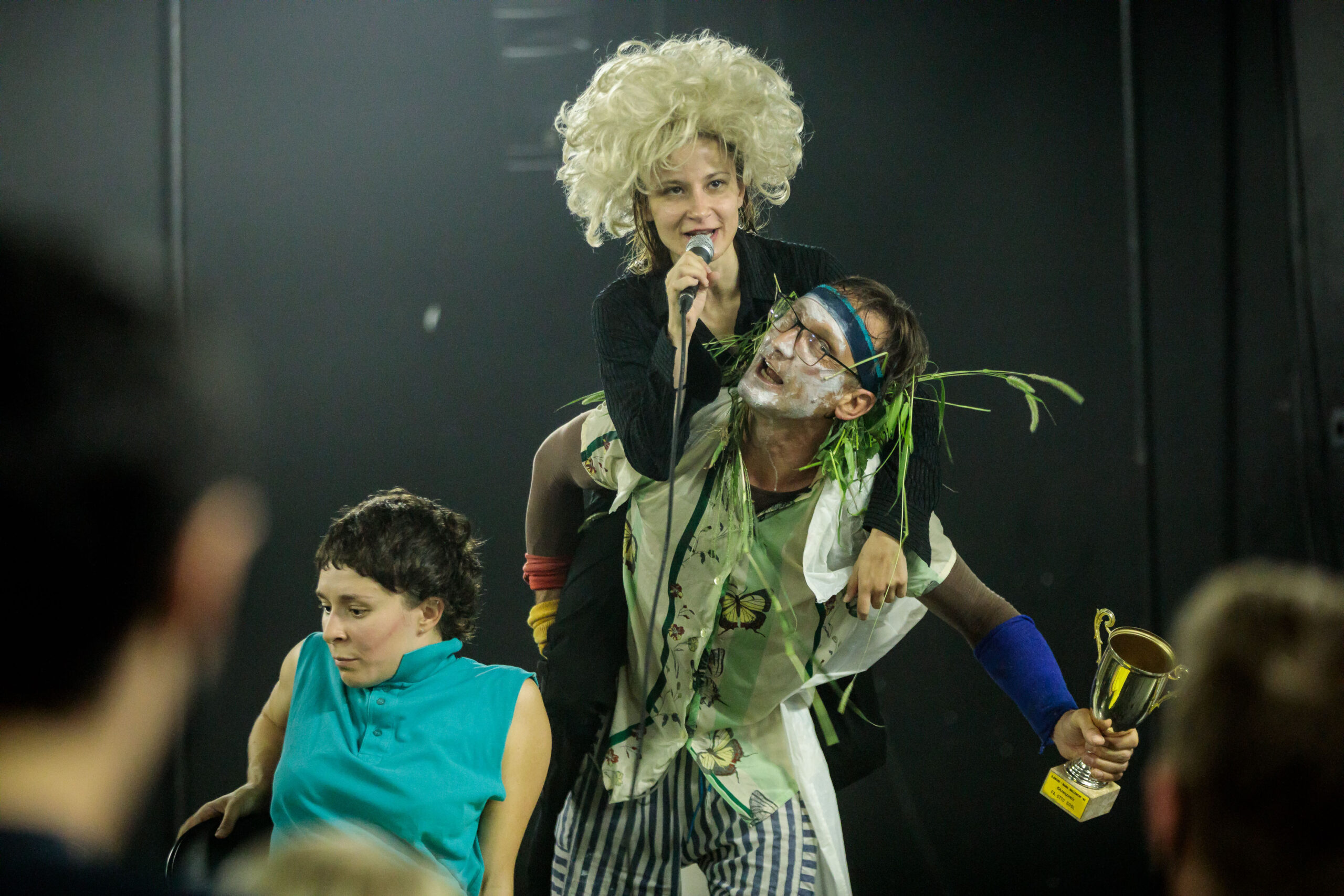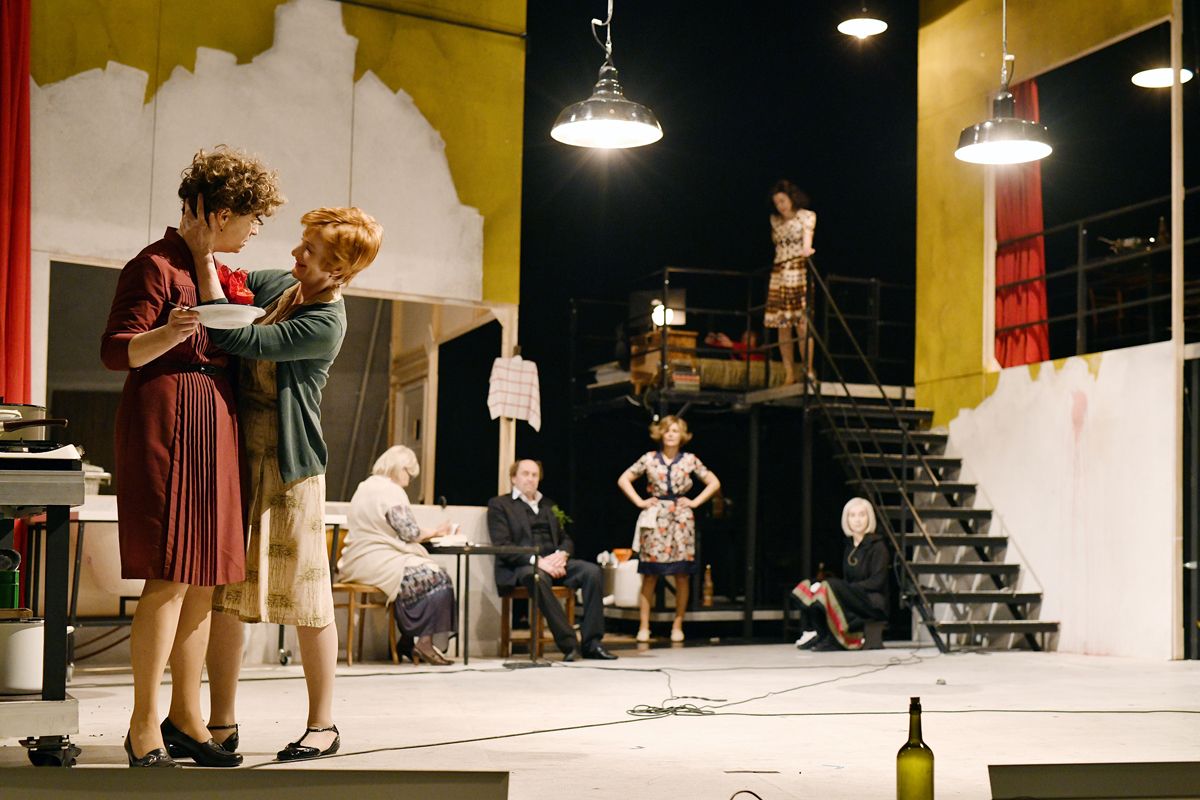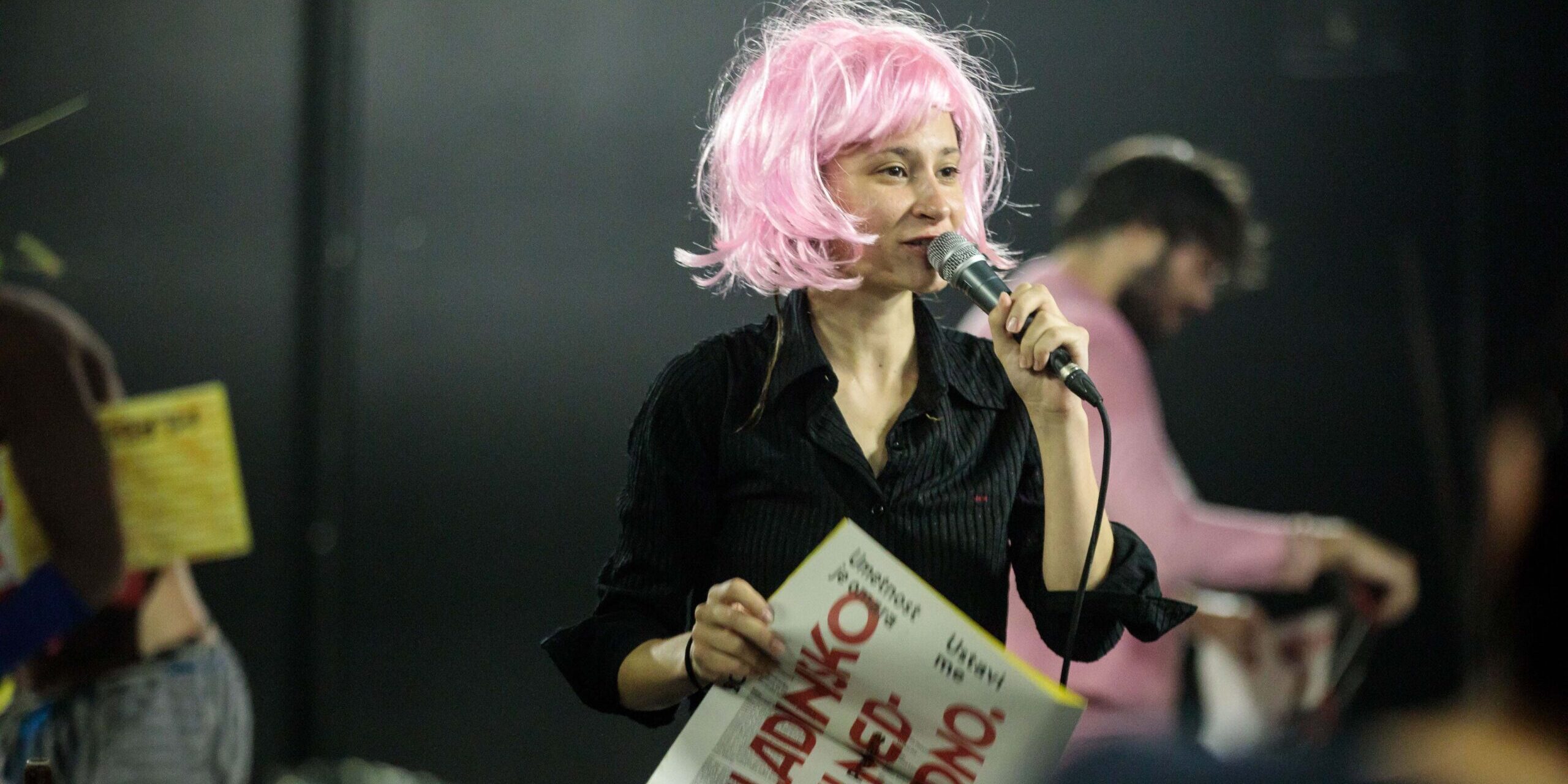Nina Rajić Kranjac is an acclaimed director whose recent show, Solo, won the Grand Prix “Mira Trailović” at BITEF 2022. Igor Burić talked to her about her creative process, the forgotten Slovenian playwright Ivan Mrak and why she’d like to make show about love.
Igor Burić: It was difficult for me to get hold of you for this interview. Are you bothered by requests to speak to the media?
Nina Rajić Kranjac: No, I wouldn’t say that! I’m happy when that happens because there is a lack of that in Slovenia. There is increasingly less concrete, professional criticism. When we do a play, I’m interested in what effect it causes, not in terms of whether it is bad or good, but whether what we created is readable.
Currently there are only three magazines [in Slovenia] in which they write reviews, and these people are not theater experts. They do not deal with criticism professionally, but they are more admirers of theater and reflect this accordingly in their writing. When I was studying theater history and dramaturgy, I noticed theater reviews were often much longer than is the norm today. There was much more space to draw a thesis, pro et contra, and explore what the show meant in a philosophical sense. The work was observed almost scientifically, not only what the artist wanted to say with it, but also why we need it today. In this sense, I feel good when I come across an interview that opens up questions so that someone who is not involved in theater can take from it new ways of thinking and looking at theater. When that is lacking – in both institutional and non-institutional contexts – it puts us all in the capitalistic system, where we need to fight to make a profit.
Igor Burić: Theater roundtables these days have become a little like press conferences, like advertising campaigns for plays.
Nina Rajić Kranjac: I agree. I think that follows the logic of the capitalist model. We talk much more about why someone should watch a play, instead of talking about what is being watched, or why it’s important as a social issue.
I once met Jovan Ćirilov. He was speaking in a library in Belgrade, and I was 17 years old at the time. I left that building full of insights and with an impression of how little I knew about some things and how narrowly I think. Today, I miss such authorities. I think we lost them either because they went abroad, or because we no longer think that we need these people here with us.
Our perception of time has also changed. A press conference that would act as an extension of a play, and not an advertisement for it, would take more than 40 minutes. And in the field of work today, we are all too busy for that.

Solo, Mladinsko Theatre, Ljubljana
Igor Burić: With this you raise the question of responsibility for me, in the work I do, and even now as we are talking, I am thinking about how much time I have and what kind of discourse should I use!
Nina Rajić Kranjac: It seems to me that some limitations are not necessarily bad. For example, a limited number of characters can be used in a very creative way. To articulate the essence of something with only a few words is a real challenge. But for me, the reason people look at their watches is a search for meaning. If that meaning is not there in the middle of the event – be it a performance or a roundtable – then the audience will not feel invited. I think that’s where the fire goes out.
I have very good memories of Desire Central Station [the theatre festival in Subotica, where Solo was performed last year]. There was no round table, instead the audience organized itself in a way that turned out to be informal, but not banal. Or after BITEF, where Tijana Grumić, moderated the conversation and asked questions to which we didn’t really have an answer; she presented us with dilemmas. We need this! That’s when the conversation starts. When a topic or question is raised that cannot be answered immediately.
Igor Burić: Is that what you try to do with all your plays?
Nina Rajić Kranjac: Well, yes! It is always related to some question that grows in me and then I use the creative process to answer it and, of course, “to paint” the problem from all possible angles.
Igor Burić: What processes do you use to realize the shows you direct?
Nina Rajić Kranjac: It depends on the group of people I am working with. Not everyone is ready to work in the way that I like to work the most. In some institutional contexts, I find myself taking on the role of the leader and presenting a plan. When I succeed in this, people feel safe with me and then we can move on. If I had entered into a process in which we tried to investigate things together, this would not have been the case, nor would it have ended as well.
In non-institutional spaces, however, a kind of warming up around the topic can be very fruitful. It allows us to explore the problem from the other side. It awakens new visions. It is then I feel like when I was with Ćirilov. Solo is just such a project, because it involves a group of collaborators who participated to the same extent in its creation on the stage.
Igor Burić: Could you tell me more about how your perspective and background shaped your specific directing style? Did it come to you spontaneously?
Nina Rajić Kranjac: I am developing the courage to try new procedures every time I direct. Change is the law of the theater! You come in feeling one way, and my goal as a director is for you to go out feeling another way. Not in a “Oh, fuck, now I’m going to do everything differently!” fashion, but for something to happen to you as a spectator. I look at the play as an event, a happening.
The strategies I use again depend on the context in which I am working, on the collaborators I am working with, and the main topic being explored. For example, I just finished a play at SNG Drama Ljubljana [The Mrakijada, which is based on a collection of texts by the Slovenian playwright Ivan Mrak], where we took an old Slovenian text which had been forgotten, its author marginalized. This was society’s fault, but also to an extent he enjoyed being marginalized. For him, it meant that he was authentic and a real artist, something which is already a myth in Slovenia.
We all know here about the story of the Sugar Factory, [the former factory in Ljubljana that became a residence for writers and poets] of Ivan Cankar and the generation of artists of the modernist era who eventually died of tuberculosis. Mrak is the heir of those people.
He lived from 1906-1986. It could be said that he invented performance, of a certain kind. It’s not written anywhere and maybe I’m being foolish in saying this, but it is true he wrote his own texts and acted in them himself. When they asked him to direct something else, he said: no, thank you. He wasn’t interested in doing that.
This was a time of verse-speaking, when theaters were full of Shakespeare and Moliere. Even before the war when the Italian fascists took over, even in those conditions he wanted to put lower forms of language, Slovenian slang, on the stage. So, he was a rebel in every sense. He knew that we were a people under occupation, where the basic drive is one of survival, and he turned a mirror on that. He said we should not do that. For me, the main question was – what was he condemning those others for?
Now, when I watch The Mrakijada in SNG Drama, it seems like it’s not mine – the show is semi-realistic, and in a completely different form from mine. It lasts over five hours across different parts and the approach in every part is so different that it is as if more than one person directed the play. I’m wondering if that means I’m not well? Or this is how it seems to me. I’m self-critically evaluating myself.
I stand behind that play though; it’s mine, but the response of some people who’ve watched it is that they were waiting for it to start to look like it was mine. It always seemed bad to me for an author’s style to be foregrounded so much, because then it seems to me that it has limits. That’s why I’ve always been inspired by directors like Dušan Makavejev and Želimir Žilnik, and to all those people who adhere to a certain philosophy, a certain view of the world.

The Mrakijada, SNG Drama. Photo: Peter Uhan
Igor Burić: As a young director you quickly started to win awards and recognition. You are often cited as the youngest woman to win this or that award. How do you feel about this? Have you faced discrimination as a result of your gender and age?
Nina Rajić Kranjac: The youngest, a woman… These are the criteria of the people who give these accolades. But I would not be able to continue working as I want without these awards. I would not have gained the trust of artistic directors, or a lot of the older artists who have collaborated with me. That’s why I need these awards, whether I won them too fast or quite early doesn’t matter to me. The author has to form her own vision, and someone has to believe in it. If there is no critical acclaim, then there is less chance that this will happen.
Igor Burić: What inspires your choice of texts, topics, and issues which you address with your shows?
Nina Rajić Kranjac: There is one topic which defined me in the beginning and still does. It is the mechanism of the individual versus the environment. That inspired me the most in Brecht’s work. I am interested in the idea of the theater as a space where we enjoy art collectively. Even though I’m sitting alone in a chair, I’m still sitting with fifty or more people – it affects me. I find that phenomenon interesting. How does it affect us?
Is it possible to get out of that circle of the collective? Is there ever a moment in which you are truly and completely apart from everyone else? Are there ways in which that environment ceases to be? Is it in the manner of the ‘idiot’ of ancient Greece, [the private, self-interested individual, who distances himself from public life?] . What does that say about society? I think we cannot erase that environment from the individual and that is something that fascinates me.
Also, there are those questions of personal identity, whether or not it is mine… Why this fascinates me so much, I have no idea. I was born in Belgrade, moved all over the world, my mother is half-Croatian-Slovenian, my father is half-Dalmatian-Serbian, my whole family. Then war, then ideology… Trying to understand someone’s starting point, their “DNA”, opens up questions for me. And I am not finished with this topic. I am still moved by texts that, in some way, lucidly, open all of that up.
At one point, the texts I chose looked back on the recent Balkan wars, so they became a kind of abuse of that topic in a way, and I didn’t know if we were really talking about the wishes of the author or more psychological mechanisms that should be approached in a scientific way – what was actually the truth within it?
Now it seems to me that the questions of interpersonal relationships are slowly starting to enter the frame, so that I can make a play about love. What is it? I would explore how the environment perceives it and what a person is within it, the norms, requirements, culture, religion… I’m interested in that socially, and in a personal way.

Nina Rajić Kranjac:
Igor Burić: You do not shy away from acting in your own plays. How does this relate to your view of the role of the director in contemporary theater?
Nina Rajić Kranjac: My goal in Solo was not to take on the role of an actress, but to take on the role of a director who has been placed on stage. But I have also acted in other plays. I have sung. I enjoy performative work. It’s great for me as I enjoy not having to take on all the responsibilities of a director, to let myself go.
Now people even call me and say you’re going to sing in this show, but could you also tell us what you think it’s like and what we should do. Now I am more and more self-conscious about this. And that is what started this conversation, this question of how to create an atmosphere or workspace in which everyone can awaken their greatest potential. Very often it has to do with a feature of the text with which we are working, but I am no longer interested in the catharsis that I find in the text; I would rather enable that catharsis by watching people attain absolute freedom and then use that form to speak about fear, about war… There are no limits.
People are motivated by the content they create in dialogue with me. A director who has a vision, who is a dictator, can make people feel safe by seemingly knowing everything and letting them leave it all up to him, but this actually invalidates them. They develop only what is inside the material and then you hear them ask: would you like me to do that, or would you like me to do this? Do you think that way is better, or this? In fact, it is more emancipatory the other way around, in a controlled process in which it is clear what we are researching, what we are exploring. I take responsibility for my role, and this is what frees people.
For more info on Solo, visit: Mladinsko.com, for more info on The Mrakijada, visit: Drama.si
Further reading : review of Solo (2023)
Further reading: Desire Central Station 2022: exhilarating, playful, questioning
Igor Burić has 20 years of experience in journalism. He is active in arts criticism and cultural fields, as well as social engagement, writing articles, moderating roundtable debates, coordinating projects, programming festivals, and editing special editions.. He has received three awards for journalism and criticism, one for the newspaper Dnevnik, one international (the Konrad Adenauer award for young journalists) and one national (Sterija’s award for theatre criticism).








